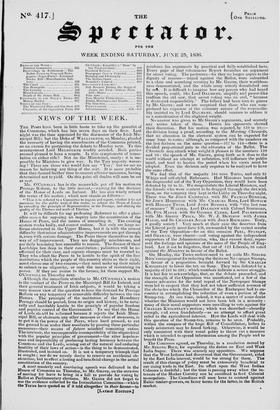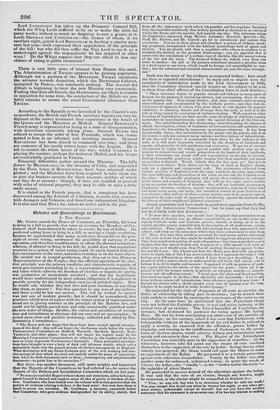NEWS OF THE WEEK.
THE Peers have been in little baste to take up the gauntlet of the Commons, which has lain seven days on their floor. Last night was the time appointed for the discussion of the Irish Mu- nicipal Bill ; but the Duke of WELLINGTON, on Monday, pleaded the necessity of having the amendments of the Commons printed, as an excuse for postponing the debate to Monday next. To this arrangement Lord MELBOURNE readily acceded. Both parties seemed pleased to have a respite. Is this symptomatic of irreso- lution on either side? Not on the Ministerial, surely : it is im- possible for Ministers to give way. Is the Tory majority waver- ing? There are those who would fain say "Yes;" ;" but we see no reason for believing any thing of the sort. It is more probable that they desired further time to concert ulterior measures, having determined not to yield. On this point all doubts will soon be set at rest. Mr. O'CONNEL m L has in the meanwhile put off his motion on nt,wa Peerage Reform, to the 30th instant,—waiting for the decision of the House of Lords on Ireland. Ile has also wisely revised the terms of his motion ; which now stands as follows- " That it be referred to a Committee to inquire and report, whether it he riot necessary for the public weal of this realm, to reform the House of Louis, 'by extending the principle of Representation in the Peerage, and altering the quality of the Electors and mode of Election." It will be difficult for any professing Reformer to offer a plau- sible reason for opposing an inquiry into the constitution of the House of Peers, and the means of amending it. The existing system works badly, and cannot endure. Not only are large re- forms obstructed in the Upper House, but it is with the utmost difficulty that minor administrative improvements are got through it, even with serious damage. The Peers throw themselves in the way of all improvement. They are doggedly mischievous, and are daily becoming less amenable to reason. The disease of their Lordships lies deep in their constitution; palliatives will be in- effectual for their cure, and organic changes must be resorted to. They who admit the Peers to be hostile to the spirit of the free institutions which the people of this country claim as their right, must choose one of two courses,—they must make up their minds to submit to an oligarchy, or seek the means of restraining its power. If they are averse to the former, let them support Mr. O'CoNNELL on Thursday next. Although the immediate stimulus to Mr. O'CONNELL'S motion is the conduct of the Peers on the Municipal Bill for Ireland, and their general treatment of Irish subjects, it would be taking a 'very narrow view of the question to base the demand for Peerage Reform on any temporary or removable difficulty between the two Houses. The principle of the institution of the Hereditary Peerage should be proved, from its origin and history, to be natu- rally and inevitably hostile to the principle of popular freedom and popular control of the Government. To say that the House of Lords should be reformed because it rejects the Irish Muni. tips' Bill, or obstructs any other measure or class of measures, is to put' it in the power of the Peers, when hard pressed, to cut the ground from under their assailants by passing those particular measures—their means of future mischief remaining entire. The intrinsic, the unconquerable incompatibility of the oligarchical with the popular principles of government—the utter hopeless- ness and impossibility of producing lasting harmony between the Commons and the Lords, arising out of the natural and enduring hostility of their laws of action—is the thing to be demonstrated, illustrated, and insisted on. It is not a temporary triumph that is sought ; nor do we merely desire to remove an accidental ob- struction, but to effect a lasting and beneficial change in the actual constitution of the country. A most masterly and convincing speech was delivered in the House of Commons on Thursday, by Mr. GROTE, on the occasion of moving for leave to bring in a bill to provide for voting by Ballot at Parliamentary elections. Mr. GROTE did not forget to use the evidence collected by the Intimidation Committee—which the Tories have quoted as if it told altogether in their favour—to reinforce his arguments by practical and fullyestablished facts, Every page of that voluminous Report furnishes an argument for secret voting. The pretences—for they no longer aspire to the dignity of reasons—urged against the Ballot, were submitted to a close and searching scrutiny by Mr. GROTE, their worthless- ness demonstrated, and the whole array utterly demolished one by ont. It is difficult to imagine how any person who had heard this speech, could, like Lord DALMENY, stupidly and parrot-like reaffirm the old saw, that secret voting was an evil, " because it destroyed responsibility." The fallacy had been torn to pieces by Mr. GROTE; and we are surprised that those who can com- prehend his exposure of the visionary nature of the responsibi- lity insisted on by Lord DALMENY, should venture to adduce it as a consideration of the slightest weight. No answer was given to Mr GROTE'S arguments, and scarcely any notice taken of them. Herein his opponents showed their discretion. But his motion was rejected, by 139 to 88;— the division being a proof, according to the Morning Chronide, that no alteration in the electoral system can be expected for some time to come; although, as compared with the numbers on the last division on the same question-317 to 144—there is a decided proportional gain to the advocates of the Ballot. The Chronicle may attach what weight it pleases to the numbers 139 and 88: the speech of Mr. GROTE, going forth as it does to the world without an attempt at refutation, will influence the public mind, and tend to hasten the period when his views must be adopted. Even the division only requires to be analyzed to have the same effect. the We find that of t majority 104 were Tories, and only 35 Reformers. Had Mini Whigs and self-styled Ministers been denied the disgraceful aid of the Tory Opposition, they would have been defeated by 88 to 35. We congratulate the Liberal Ministers, and the friends who were content to be dragged through the dirt with them, on the company they kept in the Lobby on Thursday night.
P
There was Sir JOHN CAMPBELL with Mr. FRANCIS BONHAM, Sir JOHN HOBHOUSE with Mr. CHARLES Ross, Lord Howic with HORACE TWISS, Lord JOHN RUSSELL with "the last rose of summer" WALTER, 1.0rd DALMENY with Colonel SIHTHoRe, Mr. Fox MAULE with Sir GEORGE CLERK, Lord PALMERSTON' with Mr. GROVE PRICE, Mr. W. .1. DENISON with JAMES HALSE, and Sit CHARLES ADAM with JOHN RICHARDS. Truly, a goodly society ! Very much at their ease the deserters from the Liberal party must have felt, surrounded by the veriest scrubs of the Tory Opposition—for on this occasion PEEL, STANLEY, and GRAHAM, were absent—and voting against the independent supporters of the Administration, who, they cannot deny, repre- sent the feelings and opinions of the mass of the People of Eng- land. Let it not be forgotten, that out of 123 Liberals, 88 voted against the Ministers in favour of the Ballot. On Monday, the Tories endeavoured to set aside Mr. SPRING RicE's arrangement for reducing the duties on Nee spaper Stain ps, in favour of a proposition brought forward by Sir CHARLES KNIGHTLEY to lower the tax on Soap. They were defeated by a majority of 241 to 208; which numbers indicate a severe struggle. It is but fair to acknowledge, that, as the debate proceeded, and the strength of the Opposition was manifested, not a few of the fo sincere advocates for the total repeal of the Newspaper Stamps were led to suspect that they had not taken sufficient account of the obstacles which the Chancellor of the Exchequer had to en- counter in accomplishing the reduction of even a portion of the Stamp-tax. At one time, indeed, it was a matter of some doubt whether the Ministers would not have been left in a minority : many of their usual supporters were unwilling to vote against Sir CHARLES ENIGHTLEY'S motion; which was described—absurdly enough, and even fraudulently-,-as an attempt to afford great relief to the agricultural interest. How the Lords will deal with this question of the Stamp-tax, remains to be seen. Probably, within the compass of the huge Bill of Consolidation, bribes to needy aristocrats may be found lurking. Otherwise, it would be only consistent with their usual policy to throw out a measure which is intended to spread information among the People and to benefit the Press. The Commons agreed, on Thursday, to a resolution moved by Mr. SPRING RICE, for equalizing the duties on East and West India Sugar. There was scarcely any opposition. We suppose that the West Indians had discovered that the Government, aided by the East India interest, would be too strong for them. The result of this change of policy must be extensively beneficial to our rising trade in the East. Its effect upon the West Indian Colonies is doubtful ; but the time is passing away when the in- terests of the Mother Country can be sacrificed to feed Colonial monopolists. The Canadians will soon have to contend against Baltic timber-growers, on fairer terms for the latter, in the British market. Lord LYNDHURST has taken up the Prisoners' Counsel Bill, which the Whig Lords suffered to lie on or under the table for many weeks, without so much as deigning to cast a glance at it. Lords DENMAN and COTTENHAM—the former of whom, if we recollect right, joined Lord BROUGHAM in burking a similar mea- sure last year—both expressed their approbation of the principle of the bill : but why did they suffer the Tory Lord to use it as a makeweight against the unpopularity he has acquired in other ways ? Do the Whigs suppose that they can afford to lose any chance of rising in public estimation ?



























 Previous page
Previous page